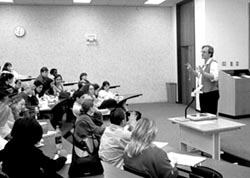Students attending Loyola University are expected to receive an education grounded in Jesuit ideals. Part of this education includes completing the common curriculum, which mandates that students take courses in religious studies.
However, unlike the storybook tales that some students heard in Sunday school, these courses educate students about the historical and sometimes provocative side of religious history.
Faith Sylve, a political science junior with a minor in world religious studies, said that she thinks you cannot have a belief in anything until you question it for yourself.
She said that while her religious beliefs have been reaffirmed by studying religion, she understands why some people are disturbed by what they are taught in college.
“You learn the more vulgar side of church in college and it causes some people to turn away [from what they were taught],” Sylve said.
Robert Gnuse, religious studies professor, has taken a mental inventory of students’ mentalities in his classroom.
“In a class you have two types of students: faithful believers and those who don’t believe. Those who believe should strengthen their faith [by studying religion]. Others should develop an appreciation for other religions.”
Gnuse said Loyola’s method of teaching religion to students is at an academic level similar to a level that is taught in seminaries. Gnuse said that by moving toward a more advanced level, the school is correcting mistakes that should not have been taught to students in the first place. “Most misconceptions are taught by pious lay people who are repeating what they were taught,” Gnuse said.
Gnuse educates his students on the changing positions of the church on major issues.
“In New Orleans Catholic schools, they condemn the evolution theory but [the students] do not know the church’s teachings,” said Gnuse. He said that the church accepts the idea of evolution but is conflicted on the theory of human evolution.
The Rev. Peter Bernardi, S.J., religious studies professor, said that he believes that it can be unsettling for students to study the Bible using historical-critical methods if they were taught to only accept a literal interpretation of the Bible. But he stressed that one must understand the intentions of the authors and the historical context in which the passages were written in order to correctly interpret the Bible.
If the historical context of the Bible differs so much from its interpretation in Catholic and Protestant churches, the question remains of why the church continues to present the Bible as it has been traditionally taught to the masses. In many instances, the pastor may feel pressure from his congregation to continue teaching the Bible as it has been so as not to anger those who have spent their whole lives believing in its literal interpretation.
However, some believe that a simplistic teaching method reaches a wider range of people. “Historical backgrounds won’t reach the unwed mothers or the druggies.
“The preacher has to preach what he preaches or teach what he teaches based on the situation,” Sylve said. However, she does feel that it is unfortunate for people to have to be educated at a collegiate level in order to learn the history behind their religion.
The study of religion is one aspect of educating the whole person, academically and spiritually. According to Sylve, “You have to be at a certain spiritual level in order to keep your historical and spiritual beliefs in line.”

Touchdown Jesus is a prominent Loyola staple. (Charles Costello)






